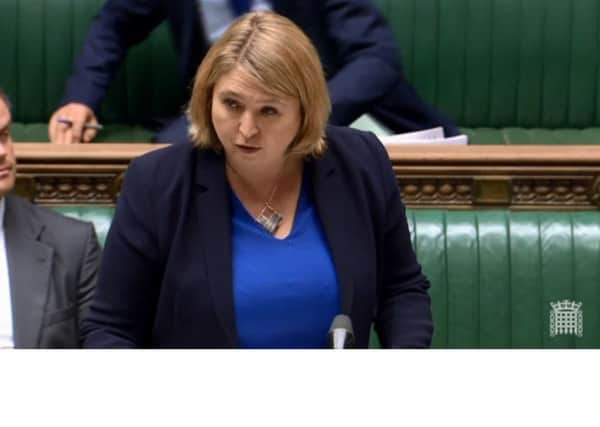Potential for decisive votes today on gay marriage and abortion law


The legal changes could become law very soon if amendments are passed to a piece of legislation proposed by the Secretary of State, Karen Bradley.
The changes will only come if the Commons’ Speaker today allows the amendments to be debated and then if a majority of MPs support them.
Advertisement
Hide AdAdvertisement
Hide AdOne of the amendments, from Ulster-born Labour MP Conor McGinn, would see same-sex marriage legalised in Northern Ireland by the end of October unless devolution is restored before that point.
Other amendments from the Labour MP Stella Creasy would put on obligation on the government to set out “progress made towards meeting international human rights obligations applicable to the United Kingdom in relation to the reproductive rights of women”.
A third issue involves an attempt by the former Tory Attorney General Dominic Grieve to amend the bill in a way which could be used to block a no-deal Brexit in October.
Last night MPs began debating the legislation, with reference to the amendments which may be voted upon today.
Advertisement
Hide AdAdvertisement
Hide AdThe DUP and some Tory MPs argued that it would be wrong to interfere in devolved matters, while proponents of the changes such as Mr McGinn argued that devolution now existed in name only and Westminster had a responsibility to change the law.
The focus on the amendments meant that much of the debate over several hours last night did not revolve around the central aim of the bill – to yet again delay Assembly elections, despite the failure to see a devolved Executive re-established.
Labour, the SNP and the DUP accepted that the bill was necessary, meaning that it will comfortably pass when put to a vote today.
Mrs Bradley told MPs that the legislation was necessary to avoid an election because there had not been agreement in the talks to restore Stormont.
Advertisement
Hide AdAdvertisement
Hide AdAttempting to strike an optimistic tone, she said: “There have been signs of an emerging consensus between parties on: programme for government; the use of the petition of concern; and transparency.
“On the issues of identity and languages, and on the sustainability of the institutions, the parties have engaged actively. Here, too, there has been some agreement, but no overall consensus on these issues has yet been found.
“The two largest parties have, over recent days, been considering how an accommodation can be reached on the remaining and contentious issues.”
Simon Hoare, the chairman of the Northern Ireland Affairs Committee, described the bill benignly as “allowing the dotting of the ‘i’s and crossing of the ‘t’s, allowing civil servants to continue implementing existing policies” while Brexit and talks to restore Stormont continue.
Advertisement
Hide AdAdvertisement
Hide AdHowever, the fellow Tory MP (who he defeated in an election for the committee chairmanship) Maria Caulfield, said: “I seem to be one of the few people in this chamber who feels uncomfortable with this legislation.”.
She noted it was now two-and-a-half years since devolved government last operated and the legislation was “just can-kicking down the road”.
The debate also heard passionate speeches from DUP MPs Emma-Little Pengelly, whose contribution was praised by Labour shadow minister Stephen Pound, and Gavin Robinson, who both argued for the need for devolution and the need for political leadership which will see difficult decisions taken.
The DUP’s Westminster leader Nigel Dodds said it was unacceptable for Northern Ireland to continue to exist in “limbo” without either devolution or direct rule and said there was no need to suspend the talks over the summer.